Key takeaways:
- Coding is a blend of technical skills and creative problem-solving, requiring persistence and a logical mindset.
- Engaging in real-world projects and collaborating with others enhances coding skills and fosters community learning.
- Continuous learning and seeking feedback from peers are essential for personal growth in coding.
- Tracking progress through reflective practices and revisiting past projects can motivate and demonstrate skill development.
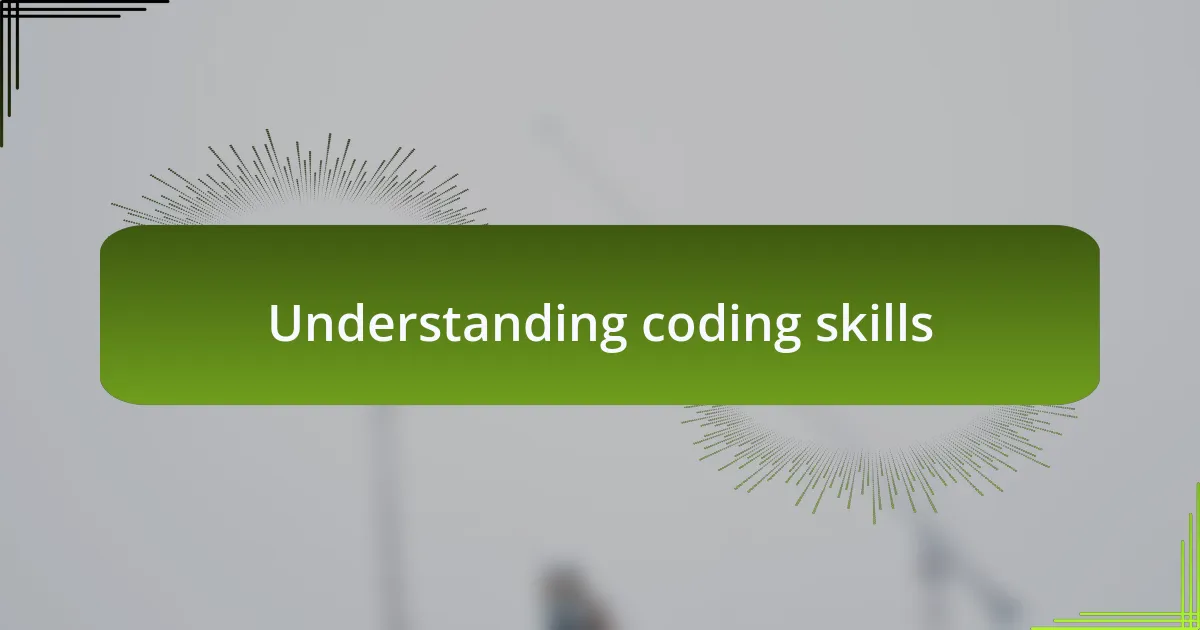
Understanding coding skills
Understanding coding skills is fundamentally about grasping how to communicate with computers and solve problems efficiently. I remember the first time I debugged a piece of code—it felt like cracking a code within a code. That moment of clarity and the rush of satisfaction truly underscored how coding is as much about persistence and creativity as it is about technical knowledge.
As I delved deeper into this realm, I realized that the ability to code isn’t just about knowing syntax or commands. It’s about developing a mindset oriented toward logical thinking and creative problem-solving. Have you ever faced a challenge where code seemed impossible to untangle? I have, and each instance taught me resilience, making every success even sweeter.
Moreover, understanding coding skills means embracing continuous learning. The tech landscape evolves rapidly, and so must our skills. I recall spending countless weekends on online courses and coding forums, and I often wondered if it was worth the effort. But that dedication transformed not just my coding abilities, but my overall approach to challenges in technology.
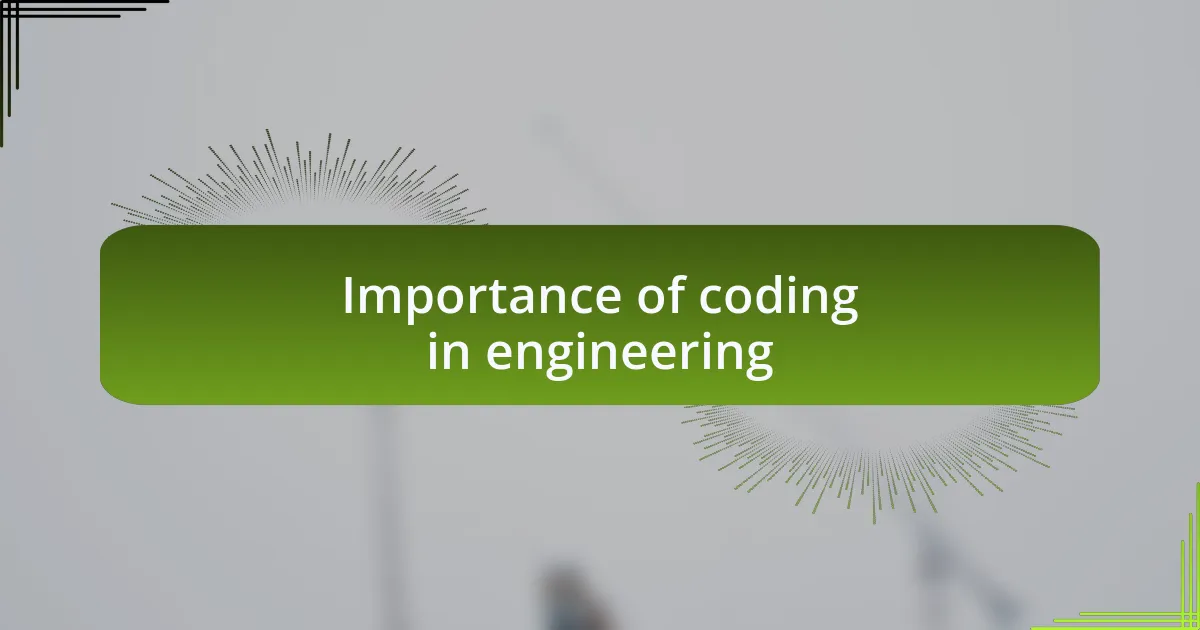
Importance of coding in engineering
Coding serves as a backbone in engineering, enabling professionals to bring innovative designs to life. I vividly remember a project where my coding skills allowed me to simulate complex engineering systems, which was crucial for optimizing performance. It struck me how the fusion of coding and engineering can yield solutions that traditional methods may not uncover.
In engineering, coding fosters collaboration across disciplines. I once worked on a multidisciplinary team where software developers, mechanical engineers, and data analysts converged to tackle a significant challenge. It was astounding to see how my understanding of coding acted as a bridge, enabling effective communication and translating ideas into practical applications. Have you ever considered how coding facilitates teamwork in diverse engineering fields?
Moreover, proficiency in coding enhances problem-solving capabilities. There was a time when I faced an intricate mechanical issue, and rather than solely relying on theoretical models, I crafted a simulation. It not only illuminated the problem’s nuances but also empowered me to test various solutions efficiently. I learned that coding is not just a skill but a powerful tool that unlocks a deeper understanding of engineering challenges.
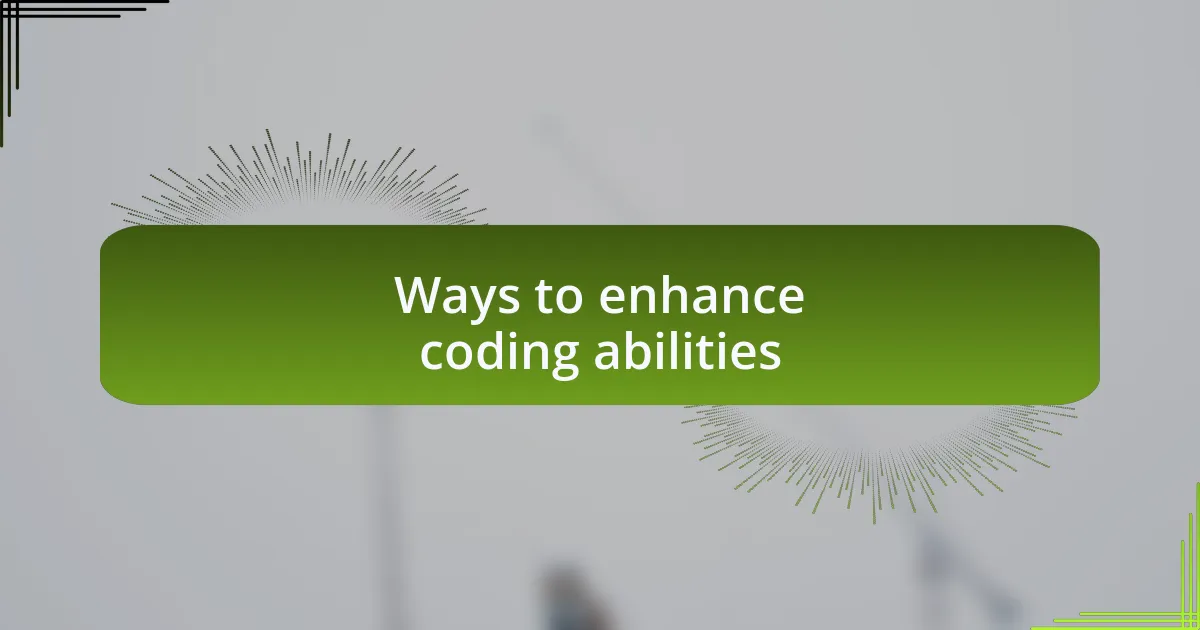
Ways to enhance coding abilities
To enhance coding abilities, one powerful method is to tackle real-world projects. I remember diving into a personal project where I developed a small application to automate my daily tasks. This hands-on approach didn’t just improve my coding skills but also gave me a sense of accomplishment as I watched my creation actually work. Have you ever felt the thrill of solving a problem by building something from scratch?
Another effective strategy is engaging with online coding communities. I joined forums where passionate developers shared their knowledge and solutions to common challenges. The exchange of ideas and feedback enriched my understanding significantly. It’s fulfilling to learn from others and realize that we’re all evolving together in this dynamic field. Have you considered how much insight you could gain by simply asking a question or sharing your own experience?
Lastly, setting aside time for consistent practice through coding challenges can make a significant difference. I began dedicating just a few minutes each day to solve problems on platforms like LeetCode and HackerRank. This routine not only sharpened my skills but also built my confidence in tackling more complex coding tasks. Have you tried incorporating daily practice into your routine? The benefits are truly rewarding.
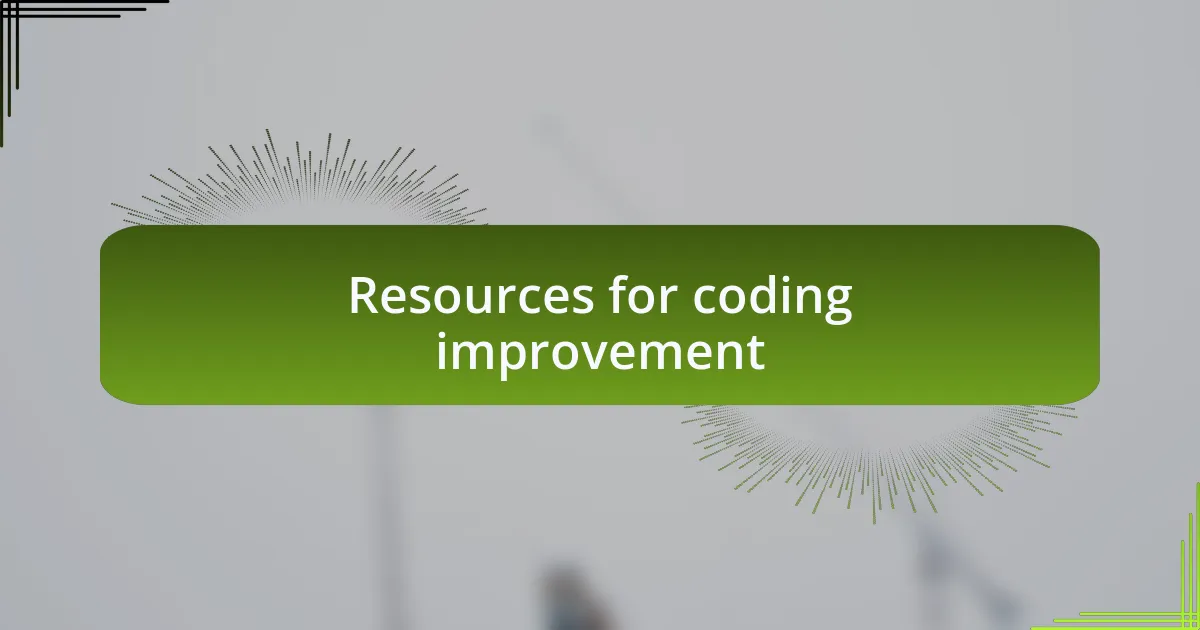
Resources for coding improvement
Exploring various coding resources has been a game-changer in my skill development. I remember stumbling upon interactive coding platforms like Codecademy and FreeCodeCamp, which transformed the way I learned. The hands-on exercises made it easy for me to grasp concepts, and the immediate feedback felt like having a mentor guiding me along the way. Have you ever noticed how much faster you learn when you’re engaging with the material instead of just reading about it?
Another valuable resource has been programming podcasts and YouTube channels that focus on tech trends and coding tips. I often listened to shows while commuting, and they’ve provided insights into industry practices and new frameworks that I wouldn’t have encountered just reading books. Listening to seasoned developers share their stories helped me visualize my own journey in tech. Have you explored audio and visual formats for learning? It might just open up new pathways for your understanding.
Lastly, I’ve found immense value in online coding bootcamps, which provide structured curricula and a sense of community. After completing one, I felt more equipped to tackle projects autonomously, and I appreciated the networking opportunities that came with it. The support from instructors and fellow students created an environment where I could comfortably ask questions and share my struggles. Have you considered how much a collaborative learning environment might enhance your coding journey?
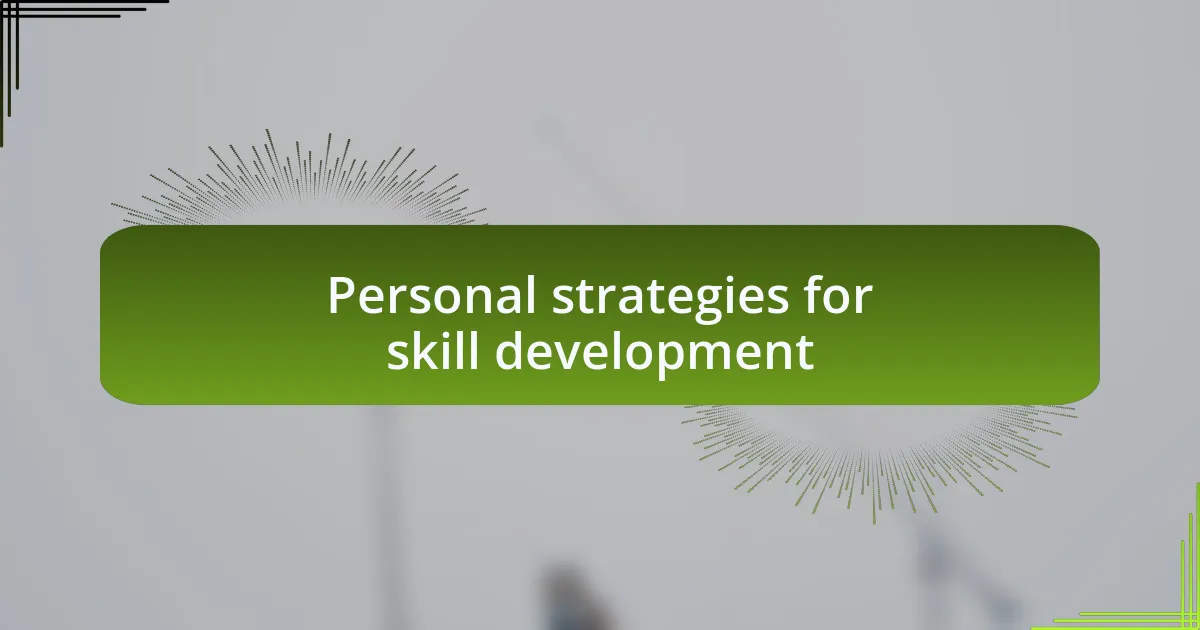
Personal strategies for skill development
Diving deep into personal projects has significantly shaped my coding journey. I recall the thrill of tackling a simple website for a friend’s business, feeling that sense of ownership. There’s something profoundly rewarding about applying what you’ve learned in a real-world context. Have you ever felt that rush when seeing your code come to life? It’s transformative.
Another strategy I swear by is setting specific, achievable goals. During a particularly busy month, I committed to coding for just 30 minutes each day. Breaking down the larger task of learning a new programming language into bite-sized segments made it less overwhelming and more manageable. I was surprised at the progress I made; consistency often overshadows intensity in fostering skills. Can you think of a time when consistent effort led to unexpected results for you?
Lastly, I cherish the importance of seeking feedback from peers. I remember posting my work on GitHub for review, and the constructive criticism I received was invaluable. It opened my eyes to best practices I hadn’t considered before, and I was motivated to refine my skills further. Have you engaged with a community that offers constructive feedback? This interaction has the potential to elevate your coding abilities significantly.
![]()
Tracking progress in coding
Tracking progress in coding is more than just measuring lines of code; it’s about reflecting on your learning journey. I remember marking my milestones in a coding journal, where I’d jot down what I’d accomplished each week. It felt empowering to see how far I’d come—each small victory felt like a building block leading to mastery. Have you ever taken a moment to look back and appreciate your progress? It’s a game-changer.
I also found that using coding challenges and online platforms to track my progress was incredibly motivating. Each time I completed a challenge, I could visibly see my skills sharpen. I loved how the platforms often showcased leaderboards, which added a fun competitive edge. Seeing my name rise up that list energized me to push harder. Can you recall a time when a little competition spurred you on to achieve more?
Another valuable tactic I adopted was regularly revisiting old projects to see how I’d improved. It was eye-opening to review my earlier code; I often cringed at my initial attempts. This reflection allowed me to appreciate not only my progress but also the evolution of my coding style. Have you ever revisited your old work and realized just how much you’ve grown? Acknowledging that growth can provide the motivation needed to tackle new challenges.
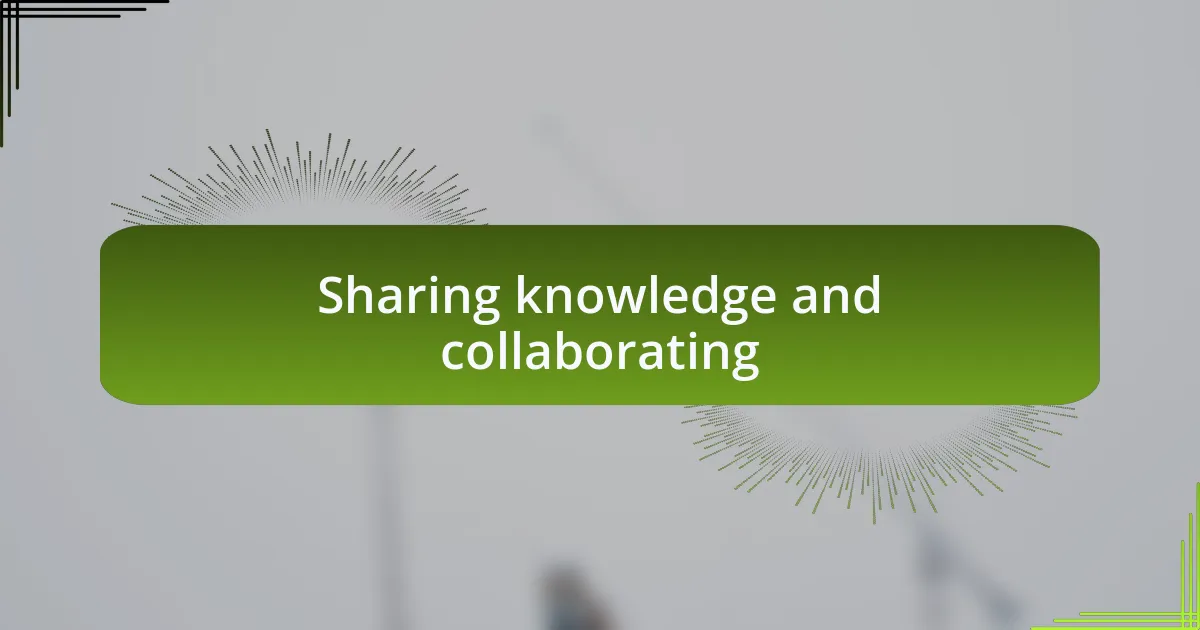
Sharing knowledge and collaborating
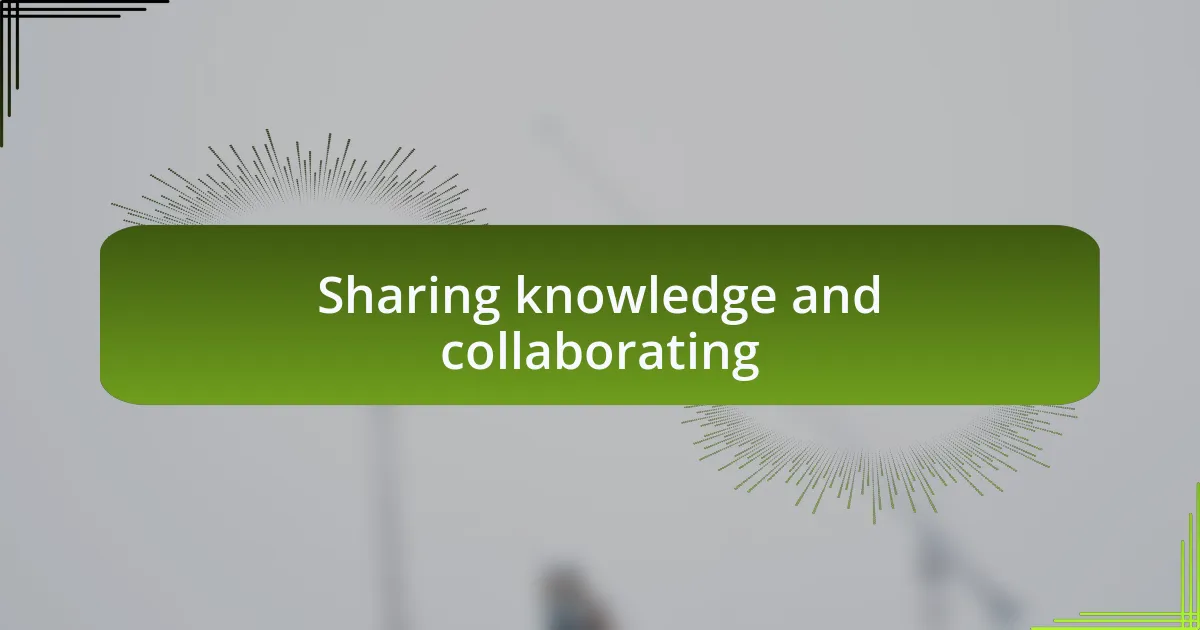
Sharing knowledge and collaborating
Sharing knowledge and collaborating with others has been one of the highlights of my coding journey. I recall a time when I joined a local coding meetup, and we spent hours discussing our projects. Engaging with fellow enthusiasts opened my eyes to new perspectives, strategies, and coding techniques I had never considered. Have you ever had a conversation that completely changed how you view a problem?
I also found that collaborative projects, particularly on platforms like GitHub, really enhanced my skills. When I contributed to open-source projects, I could see firsthand the impact of collective effort. It’s a unique feeling when your code is merged into a project that countless others will use. Have you ever experienced the thrill of watching your work come alive in a larger context?
Mentoring others has been equally rewarding for me. I remember helping a friend with their first coding project; witnessing their excitement as they solved problems was invigorating. It not only reinforced my own knowledge but also reminded me of the importance of community in learning. Isn’t it fascinating how teaching others can deepen our understanding? Sharing knowledge truly creates a ripple effect that benefits everyone involved.